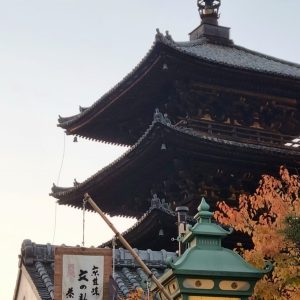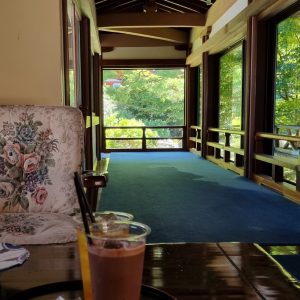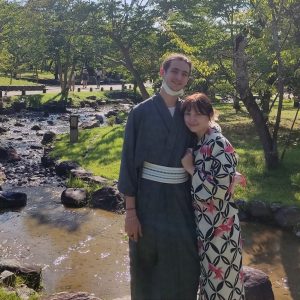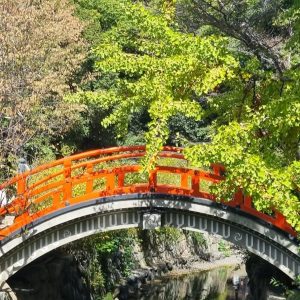Kyoto’s not all tea and wagashi
Kyoto Computer Gakuin
Nikolina Haggård Grann (From Sweden)
※Interview in 2024

How did you decide where to study abroad? Please tell us why you chose Kyoto in the end.
Since I’m a MEXT student, I didn’t get to choose where in Japan I would study, but I feel fortunate that it was Kyoto.
What are you currently studying?
I’m studying the Data Processing course in the Computer Science department of my school.
Before studying abroad, what kind of image did you have of Kyoto?
I had known Kyoto mostly as a tourist destination. I knew of the famous places like Kiyomizu-dera, or Kinkaku-ji, and so on; I thought of it as classically Japanese, and I didn’t know it outside its international image.

How did your image of Kyoto change when you actually studied abroad here?
Of course, the traditional aspects of Kyoto are undeniable, but I found out that Kyoto can also be modern and embraces Western culture as much as it does its own. In this sense, it’s eclectic. For example, did you know Kyoto is known for its coffee and bread? It’s not all tea and wagashi.

What were you nervous about before studying abroad? Please tell us in detail.
There were a lot of things, of course. I think my main concern was with language and misunderstandings. For example, what if I misunderstood a contract and ended up agreeing to something I didn’t want? Or, what if studying in the language would prove too difficult? What if I wouldn’t understand what the teacher was saying?
There’s also the aspect of support. In my own country, if I needed help I had a support system that could provide it. Going abroad meant I didn’t have anybody at first: if I didn’t know something I’d have to figure it out on my own or find somebody who knew and ask – and when arriving in a new country you don’t understand, there’s going to be a lot of that. You must be brave enough to be stupid to go abroad.
What about Kyoto makes you glad to have come here? What has made an impression on you?
I thought at first the traditional lifestyle and culture would be what I would enjoy most. Of course, I enjoy those aspects, and learning about Japanese culture through the city has been meaningful – but more than the tradition, I’ve enjoyed the nature.
Before, I lived in Osaka. I love Osaka, too, but it’s a concrete jungle; you look up and you can barely make out the sky among the sky-rises. In Kyoto, things like building height are regulated: the city is closer to the earth, and there’s nature growing everywhere. I come from Stockholm, which is often called the Venice of Scandinavia. I’ve always lived around water, and being separated from it when I lived in Osaka was claustrophobic. In Kyoto, I can walk along the Kamo River to hear the water rush. That puts me at ease.

Was there anything especially difficult about studying abroad?
I’m a prideful person; it’s better not to be. When studying abroad you must subject yourself to being the fool a lot. You’ll be laughed at for mistakes in your language, or in how you conduct yourself, and you must learn to roll with those punches. You won’t know everything, so the earlier you learn to laugh at yourself the better. In Latin, there’s the proverb “stultorum plena sunt omnia” meaning “fools are everywhere.” I think you’ll find there’s one inside of you, too.
What do you think is most appealing about studying in Kyoto?
Kyoto makes for a more peaceful place to live. If you live in Kyoto, you’ll have a quiet and relaxed home to return to. In the life of any student, that’s valuable, but for the foreign student that must make a home again, it’s invaluable.

How do you want to utilize your study abroad experience in the future?
I’ve always wanted to try and connect technologies and sciences from different countries. Oftentimes, looking at other countries, especially Japan, you might think “why do they get all that cool stuff and we don’t?” For me, I want to make those technologies available for everybody by utilizing both what I’ve learned and the connections I’ve made to build international bridges in technology.
What is your post-graduation dream?
My specific interest is in medical engineering and medical technologies. If possible, I want to develop an efficient, computerized medical system that can connect medical experts and knowledge and improve health for people around the world.

Lastly, please give a message to students considering studying abroad in Kyoto.
If you come here, or to anywhere in Japan, or to anywhere abroad, remember that there is no “wasted time.” Every moment you spend abroad is one you’ll spend learning something, so just enjoy yourself and don’t worry about doing anything perfectly. Make friends, go out, and celebrate your life.





